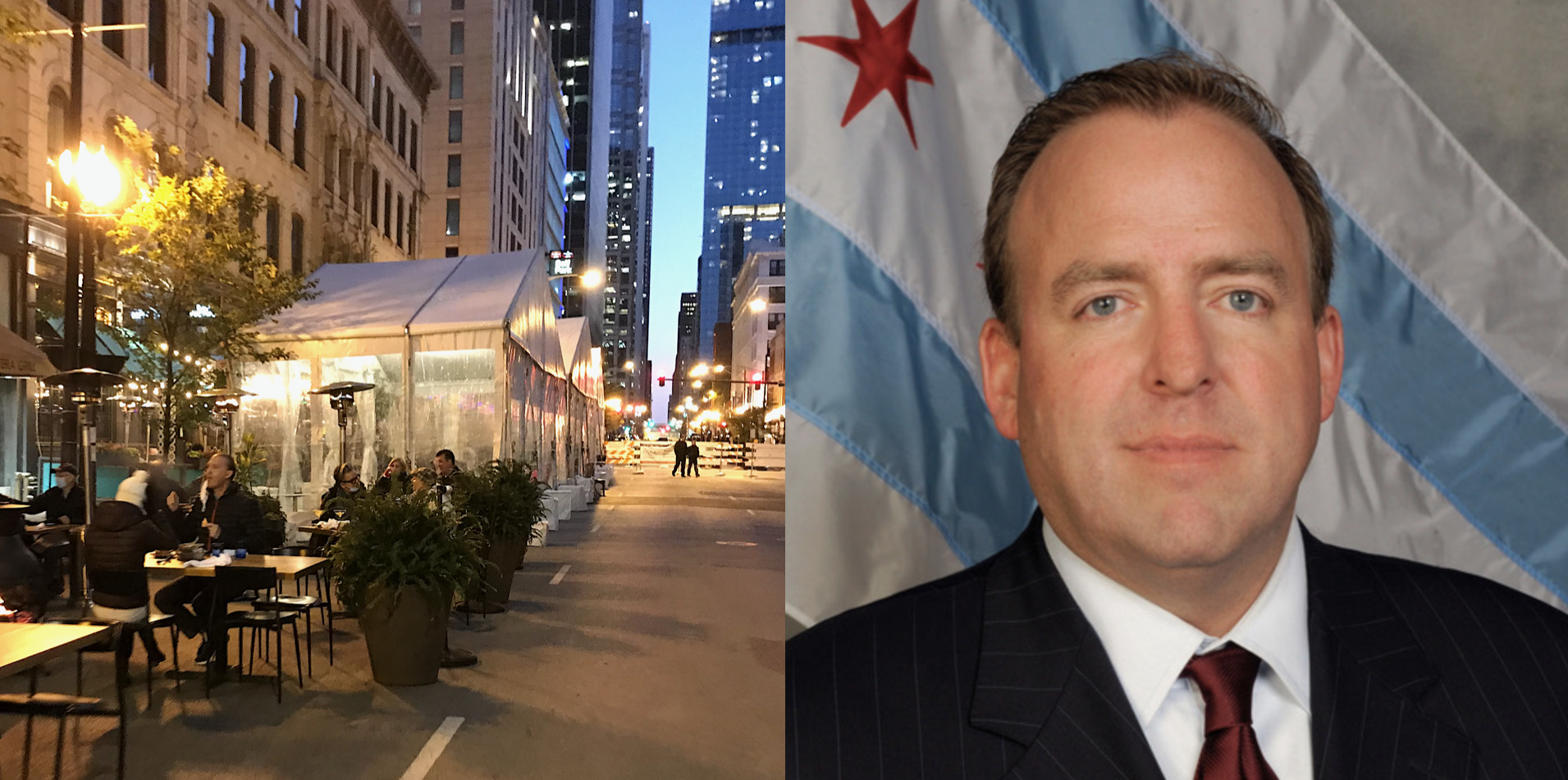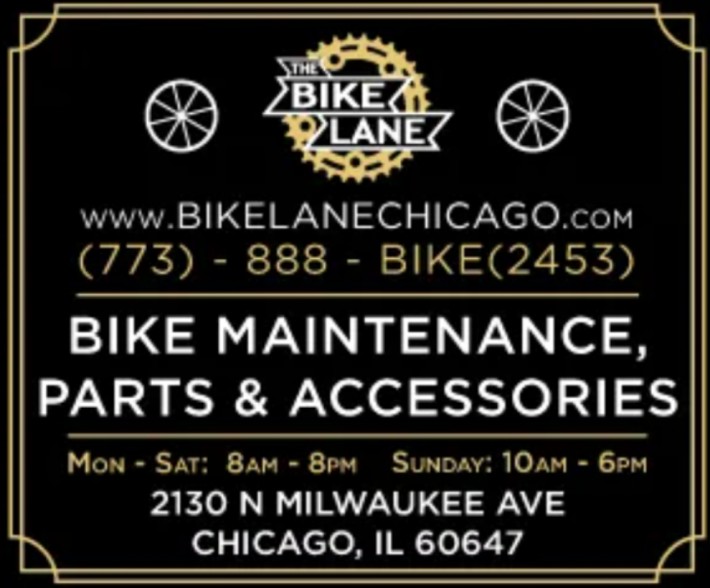
Click here to read the second part of this interview, in which Ald. Reilly discusses his attempt to win over Harry Caray's by offering to pedestrianize streets in front of the restaurant. He also offers suggestions for making the car-free dinings district happen again this year.
Update 3/30/24, 10:45 AM: A petition has been launched asking Mayor Johnson, Ald. Reilly and CDOT Commissioner Tom Carney to bring back the car-free Clark Street dining district this summer.
If you're not up to speed on the Clark Street Expanded Outdoor Dining controversy in River North, and local alderperson Brendan Reilly's (43rd) role in it, read Streetsblog's previous coverage and/or Block Club's piece. After the ward didn't responded to multiple requests from us for statements, Ald. Reilly tagged Streetsblog on Twitter and we offered to do a transcribed interview with him to clarify his position. His office then called us up to schedule this phone interview. (See, social media isn't completely useless.) The transcript has been edited for clarity and brevity.
John Greenfield: I'd like to open this interview by starting things off on a good foot by acknowledging that in the past you and I have had a couple of major differences of opinion on transportation issues. And there may have been some cases where I went a little overboard with trolling you. So I apologize for that.
Alderman Brendan Reilly: I appreciate that.
JG: And I'd also like to acknowledge that in the last few years you've done a lot of good work downtown fighting bikeway obstructions in the 42nd Ward. So I know that a lot of bike advocates have appreciated what you've done for that.
Hey look: After a reader told us about construction blocking the Wells St. bike lane next to the Merchandise Mart, and we alerted @AldReilly, he asked @ChicagoDOT to get it corrected, and now the lane is clear. 👍 pic.twitter.com/pt4VrdFpzz
— Streetsblog Chicago (@streetsblogchi) November 4, 2022
ABR: Thank you. I'm trying my best. That's a daily battle.
JG: Also, I'd like to say in advance that I don't intend to "gotcha" you at all in this interview. I'm definitely open to listening to what you have to say about the Clark Street dining district issue.
So the the first question I'd like to ask you is, in a vacuum, if there were no other factors involved, do you want to reopen Clark Street as a pedestrian and dining street? If there was no pressure from neighborhood groups or unions or other restaurants, would you reopen the dining district?
ABR: One hundred percent. You know, back in 2020 I partnered with [then-Mayor] Lori Lightfoot to create the Expanded Outdoor Dining program. After the pilot was so successful in 2020, I was one of the [alderpersons] who championed the idea of extending this program, and certainly wanted to promote it throughout my ward. And that's how the Clark Street closure came to be, as well as a street closure on Wells Street, around Huron Street, and then a third up on Rush Street by Bellevue Place that was done with Hugo's [Frog Bar], Tavern on Rush, and Gibson's [Bar & Steak House].
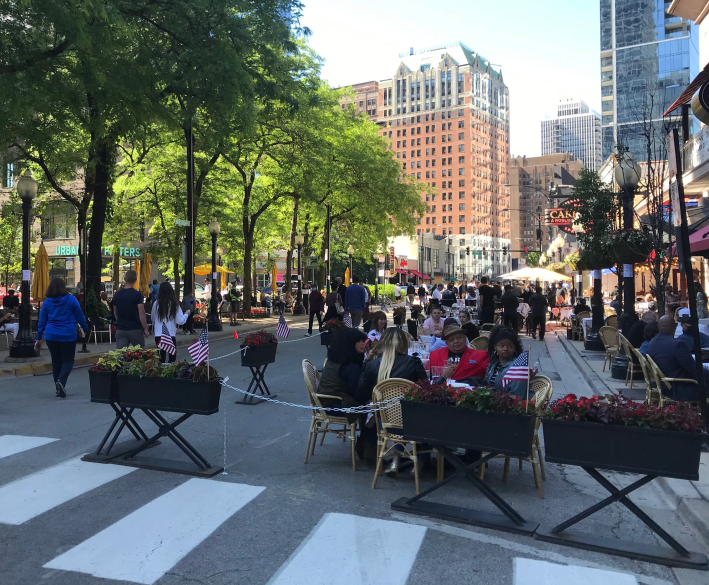
We had three of these programs going, and I was really proud of all three. And they certainly were a lifeline for these businesses during the pandemic and their employees. And during that time they became incredibly popular with diners.
And after the pandemic, the Gibson's, and Tavern [on Rush], and Carmine's [Chicago] group decided that they didn't want to continue the program, that they had plenty of indoor capacity and that operationally that wasn't the best for them. So they voluntarily decided to let that go. And with the Wells Streets businesses after the pandemic they determined that they were in decent footing and wouldn't need the additional capacity, so they also let that go.
But the restaurant owners and their employees on Clark Streets absolutely loved the program, and really embraced it. They went out and purchased, at no small expense, a lot of outdoor furniture and enclosures. They had to invest in very expensive, many thousands of dollars, Jersey barriers and security for these blocks. And what I saw, with my own eyes, was that this was incredibly popular.
And I also, because I speak with the police department daily, would regularly check in with the 18th District to see how they thought things were going. And every single conversation I had with them, it was all considered to be a net positive. By removing that traffic from Clark Street, it slowed everything down. It quieted everything down. And it frankly made it easier and more efficient for the police to patrol that district.
And so I've only received overwhelmingly positive feedback on that district, anecdotally, but also in the survey that we did last [April] asking people whether or not they enjoyed the program, whether it should be extended, and even how long it should last. And about 87 percent of my constituents said that they strongly support it, or somewhat support it. And when they were asked "For those that support - What is the suggested duration of the closure?", 76 percent of the respondents answered "as long as possible".
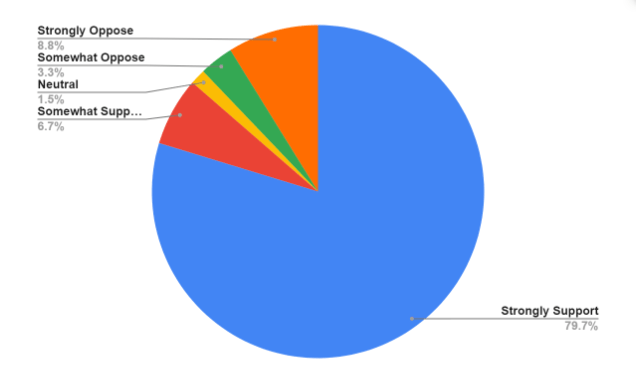
So it was truly a very popular program, which is why I was so surprised when we were carbon-copied on letters to Mayor [Brandon] Johnson [who took office last May 15] sent from various neighborhood associations and business groups opposing this. It just didn't ring true with the survey we had just come out of the field with that received well over 3,000 responses, overwhelmingly for this. These letter letters did not reflect what I thought to be the reality on the ground. But the Johnson Administration considered them to be very important, and used that one of their reasons to consider not approving the program last summer.
That was very frustrating to me. I was pulled into a conference call with commissioners from [the Chicago Department of Business Affairs and Consumer Protection], [the Chicago Department of Transportation], the [Illinois] liquor commissioner, their staff members, at the time [City Council] floor leader Carlos Ramirez-Rosa, and I believe Sam Toia was on the call from the Illinois Restaurant Association. I believe Bob Reiter was on the call from the Chicago Federation of Labor.
The first half of the call was to finish up and finalize the ordinance that would extend the EOD program post-pandemic, citywide. And so once that was dispensed with on the call, Ald. Ramirez-Rosa said, "But, hey, Ald. Reilly, we have a problem with the Clark Street closure." And I asked what it was, and he referenced these letters that these associations had sent to the mayor, and some nearby businesses that apparently didn't like this program, and said, "We're not sure this is a good idea."
And I explained the survey results I'd just received, and how popular it is, and how the police department looked at it as a positive. And I was told, "If we approve these permits for 2023, that's it. And we want you to memorialize that understanding in writing to us, and also Grant DePorter [CEO of Harry Caray's Restaurant Group - the chain has a restaurant at 33 W. Kinzie St., one block east of the south end of the Clark outdoor dining district] and to Bob Reiter."
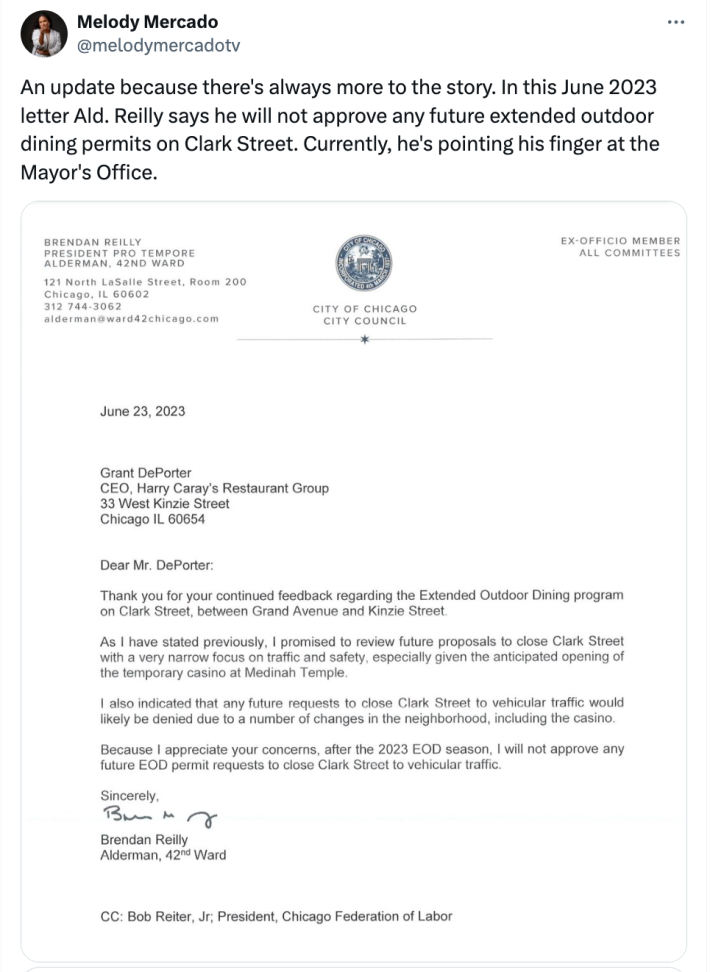
And so that was the deal, that unless I supplied them with this letter, they would not release last year's street closure permits for Clark. And we did, we supplied that letter. I did it reluctantly, because it think this is a great program. But I was very concerned that these business owners were going to lose the entire season if I didn't do this. And my hope at the time, and it's still my hope, was that over the course of the year the new mayor would evolve his position on this issue, and hopefully come to support it.
And so time will tell if that's the case, but that's how this letter came to be. It certainly wasn't my idea. I'm very proud of the program that I helped create. So it's very frustrating that the mayor is trying to portray me [laughs] as the obstacle and the person who wants to do away with the program, when in fact that's the opposite of the truth.
JG: All right, thanks for sharing that. So, again, I'm not trying to do a "gotcha" here, I'm just going to lay out what's out there, and then you can respond.
So the other day you tweeted out, "The President of the Chicago Federation of Labor and the Mayor’s now disgraced former floor leader [Ald. Ramirez-Rosa] led a conference call with various city departments to negotiate the street closure for last summer with a demand that it would be the final year of the program."
You also stated, "My constituents & businesses loved my idea to close Clark Street for dining. The Police Department also thought it made the area more safe. But Mayor Johnson chose to kill this program on behalf of his allies in organized labor – the ones who bankrolled his entire campaign."
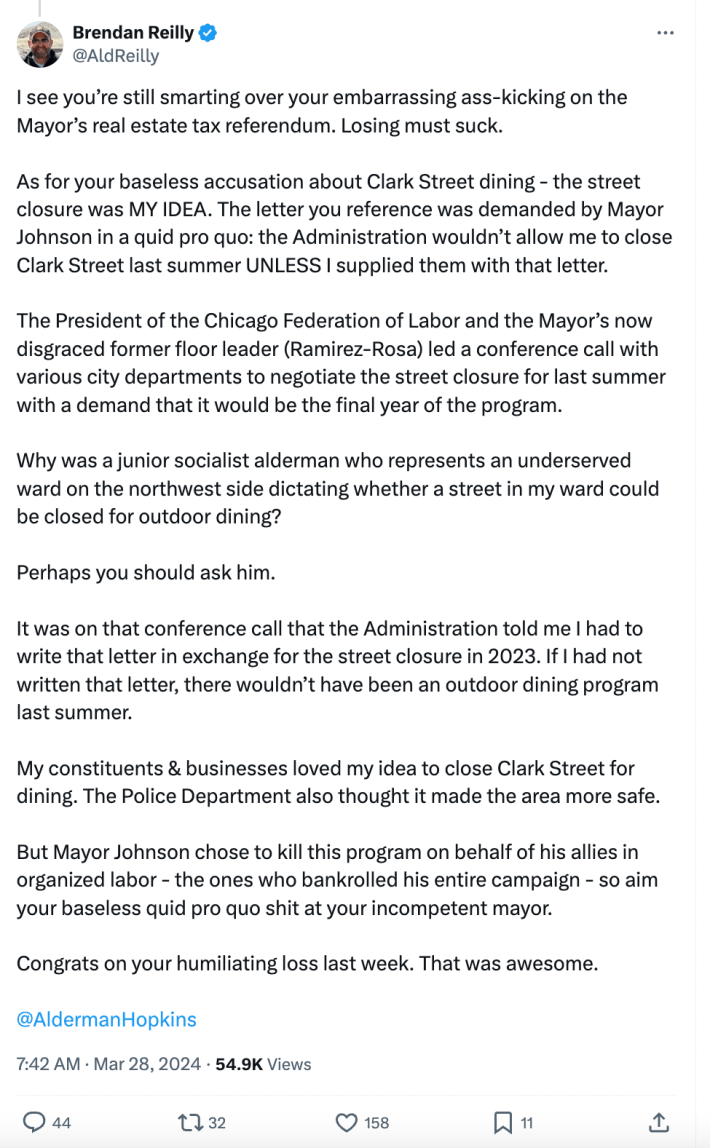
And so Bob Reiter, the president of the local labor federation said on Twitter, "I don’t appreciate the suggestion that this was labor muscling the closure of Clark Street or that anyone was working to do it at our behest. [Magnificent Mile Association], several of their members, and numerous resident groups led the charge. We were a part of the convo. But this is ridiculous."
I don’t appreciate the suggestion that this was labor muscling the closure of Clark Street or that anyone was working to do it at our behest. Mag Mile Assoc, several of their members, & numerous resident groups led the charge. We were a part of the convo. But this is ridiculous. https://t.co/3LpDBAYgMz
— Bob Reiter (@BobReiterJr) March 28, 2024
And then you responded to his tweet by saying, "To be very clear, I don’t believe the Chicago Federation of Labor muscled the end of the Clark Street Program."
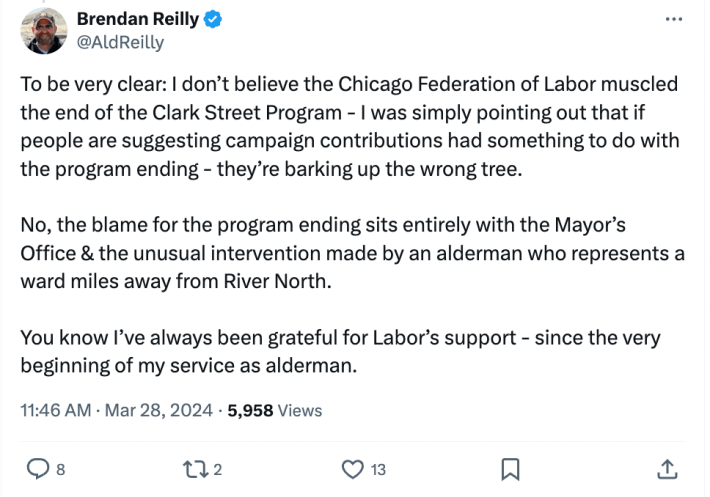
So one could argue that contradicted the previous statement that you made that [Bob Reiter] and the mayor "led [the conference call]" and your other other statment, "Mayor Johnson chose to kill this program on behalf of his allies in organized labor."
But in your reply to Reiter you said, "I don’t believe the Chicago Federation of Labor muscled the end of the Clark Street Program." Do you see a discrepancy between those two sets of comments – is there a contradiction there or no?
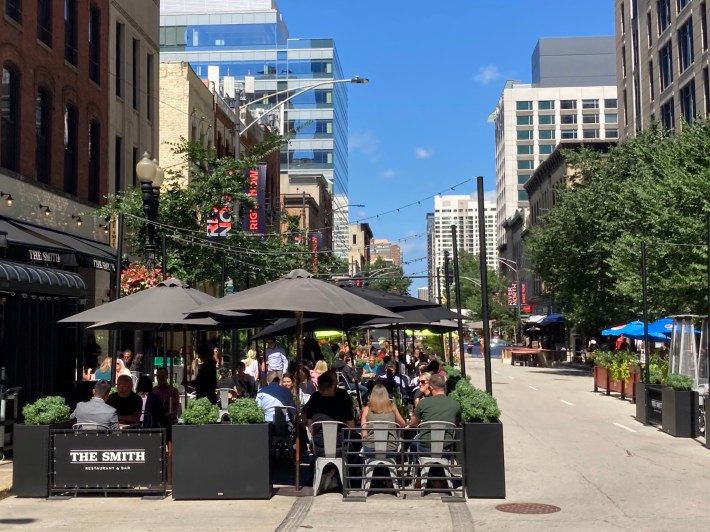
ABR: Well what I can say to Bob Reiter is, in the heat of the moment I was pretty fired up. [Laughs.] I did go too far, which is why I sent out a clarifying tweet. No, I don't think the Chicago Federation of Labor muscled this through. They were part of the conversation, for sure.
Ultimately, the blame for this lies with the mayor and his administration. I do find it curious that the mayor's floor leader [Ald. Ramirez-Rosa], who represents a ward miles from mine, took it upon himself to raise this issue regarding the Clark Street closure. He doesn't represent the 42nd Ward. So I thought that was highly irregular.
But, no, I regret having implicated the Chicago Federation of Labor in my tweet, and I corrected that. But the bottom line is that the administration, frankly, were the ones who held up the [2023] permits until July and cost the businesses two months of a fantastic outdoor dining season that would have not just benefitted the businesses, but also their employees.
Had I not supplied that letter, there would not have been an outdoor program [on Clark] that year. So it's frustrating that folks are trying to suggest that I'm the one who wants to do away with this program, because that's just simply not the fact.
Mayor Johnson's office did not respond by press time to Streetsblog's email and phone messages requesting a response to Ald. Reilly's comments. If we hear from the Mayor's Office, we'll run an update or a new post.
Update 4/2/24, 11:00 AM: Ald. Ramirez-Rosa provided Streetsblog with the following response to Reilly's comments. "I'm proud of the work I did last year to pass Chicago's Expanded Outdoor Dining Ordinance, which facilitates popular outdoor dining programs while ensuring local community sign-off. While working to pass the ordinance, I was part of a meeting between Alderperson Reilly, Mayor Johnson’s staff, and various city departments to discuss the ordinance and local concerns over the Clark Street closure. The primary matter we discussed regarding Clark Street and the ordinance was whether existing outdoor dining programs, like Clark Street, would be automatically renewed every year or require annual aldermanic sign-off. We opted for the latter in the ordinance to preserve local community input and ensure aldermanic support for the ordinance. I was not aware of Alderperson Reilly’s rejection letter to outdoor dining applicants, and played no role in drafting or reviewing his letter. As the local alderperson, Alderperson Reilly has the power to decide which outdoor dining permits to accept or deny."
Click here to read the second part of this interview.

Did you appreciate this post? Please consider making a tax-deductible donation to help Streetsblog Chicago keep publishing through 2025. Thank you.
